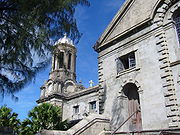
Religion in Antigua and Barbuda
Encyclopedia

Antigua and Barbuda
Antigua and Barbuda is a twin-island nation lying between the Caribbean Sea and the Atlantic Ocean. It consists of two major inhabited islands, Antigua and Barbuda, and a number of smaller islands...
is Christian
Christianity
Christianity is a monotheistic religion based on the life and teachings of Jesus as presented in canonical gospels and other New Testament writings...
. The Anglican Church is the largest religious denomination, accounting for an estimated 26 percent of the population. The Methodist, Moravian, and Roman Catholic churches account for less than 10 percent each. The United Evangelical Association, an organization that includes most independent evangelical
Evangelicalism
Evangelicalism is a Protestant Christian movement which began in Great Britain in the 1730s and gained popularity in the United States during the series of Great Awakenings of the 18th and 19th century.Its key commitments are:...
churches, claims an estimated 25 percent of the population, and Jehovah's Witnesses
Jehovah's Witnesses
Jehovah's Witnesses is a millenarian restorationist Christian denomination with nontrinitarian beliefs distinct from mainstream Christianity. The religion reports worldwide membership of over 7 million adherents involved in evangelism, convention attendance of over 12 million, and annual...
number more than 1,000 members. The total number of non-Christians is small; they include an estimated 1,000 to 1,500 Rastafarians, more than 200 Muslims
Islam in Antigua and Barbuda
The statistics for Islam in Antigua and Barbuda estimate a total Muslim population of about 200, representing 0.3 percent of the total population of 67,448. Most of the Muslim of the islands are Arabs of Syrian or Lebanese descent. There are two known Islamic organizations in St...
, nearly 200 Hindus
Hinduism
Hinduism is the predominant and indigenous religious tradition of the Indian Subcontinent. Hinduism is known to its followers as , amongst many other expressions...
, about 30 Jews
Jews
The Jews , also known as the Jewish people, are a nation and ethnoreligious group originating in the Israelites or Hebrews of the Ancient Near East. The Jewish ethnicity, nationality, and religion are strongly interrelated, as Judaism is the traditional faith of the Jewish nation...
, and approximately 50 members of the Baha'i Faith
Bahá'í Faith
The Bahá'í Faith is a monotheistic religion founded by Bahá'u'lláh in 19th-century Persia, emphasizing the spiritual unity of all humankind. There are an estimated five to six million Bahá'ís around the world in more than 200 countries and territories....
. There are more than 4,000 atheists or persons who do not follow a particular religion. The Church of Jesus Christ of Latter-day Saints claims 161 members as of year-end 2007.
The Constitution provides for freedom of religion
Freedom of religion
Freedom of religion is a principle that supports the freedom of an individual or community, in public or private, to manifest religion or belief in teaching, practice, worship, and observance; the concept is generally recognized also to include the freedom to change religion or not to follow any...
, and the Government generally respects this right in practice. The US government documented no reports of societal abuses or discrimination based on religious belief or practice in their 2007 religious freedom report, and prominent societal leaders took positive steps to promote religious freedom.

